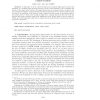Free Online Productivity Tools
i2Speak
i2Symbol
i2OCR
iTex2Img
iWeb2Print
iWeb2Shot
i2Type
iPdf2Split
iPdf2Merge
i2Bopomofo
i2Arabic
i2Style
i2Image
i2PDF
iLatex2Rtf
Sci2ools
100
click to vote
STOC
1999
ACM
1999
ACM
A Theorem on Sensitivity and Applications in Private Computation
In this paper we prove a theorem that gives an (almost) tight upper bound on the sensitivity of a multiple-output Boolean function in terms of the sensitivity of its coordinates and the size of the range of the function. We apply this theorem to get improved lower bounds on the time (number of rounds) to compute Boolean functions by private protocols. These bounds are given in terms of the sensitivity of the function being computed and the amount of randomness used by the private protocol. These lower bounds are tight (up to constant factors) for the case of the xor function and together with the results in [E. Kushilevitz and A. Ros´en, SIAM J. Discrete Math., 11 (1998), pp. 61–80.] establish a tight (up to constant factors) tradeoff between randomness and time in private computation. Key words. sensitivity, private computation, randomness, lower bounds AMS subject classifications. 68R05, 94A60, 68M10 PII. S0097539701385296
Related Content
| Added | 03 Aug 2010 |
| Updated | 03 Aug 2010 |
| Type | Conference |
| Year | 1999 |
| Where | STOC |
| Authors | Anna Gál, Adi Rosén |
Comments (0)

